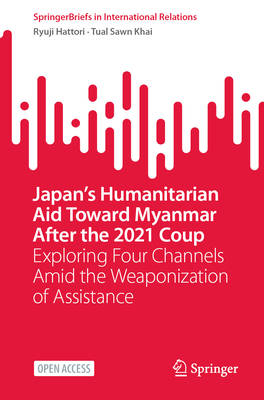
- Afhalen na 1 uur in een winkel met voorraad
- Gratis thuislevering in België vanaf € 30
- Ruim aanbod met 7 miljoen producten
- Afhalen na 1 uur in een winkel met voorraad
- Gratis thuislevering in België vanaf € 30
- Ruim aanbod met 7 miljoen producten
Zoeken
Japan's Humanitarian Aid Toward Myanmar After the 2021 Coup
Exploring Four Channels Amid the Weaponization of Assistance
Ryuji Hattori, Tual Sawn Khai
€ 57,95
+ 115 punten
Omschrijving
This open access book delves into Japan's humanitarian aid efforts in Myanmar following the military coup of February 2021. As Myanmar faces political upheaval and growing humanitarian challenges, Japan's response has been notable, yet intricate, maneuvering through obstacles created by the Myanmar military's weaponization of aid. Utilizing document analysis, semi-structured interviews, and fieldwork conducted at the Myanmar-Thailand border, this book explores four key channels through which Japan delivers humanitarian assistance: UN organizations, Myanmar-based NGOs, Thailand-based NGOs, and Bangladesh-based NGOs. Each channel is examined in detail, highlighting the strategies employed, obstacles faced, and impact of Japan's contributions on the ground. This study illuminates the precarious equilibrium between delivering crucial aid and addressing the political circumstances that hinder humanitarian endeavors. It also prompts important discussions about the morality of providing assistance in conflict-ridden areas and the responsibilities of donor nations in upholding their human rights. This book is ideal for academics, decision-makers, and humanitarian professionals, and not only enlightens readers about Japan's distinctive position in Myanmar, but also contributes to wider debates on international aid dynamics in politically fraught environments.
Specificaties
Betrokkenen
- Auteur(s):
- Uitgeverij:
Inhoud
- Aantal bladzijden:
- 93
- Taal:
- Engels
- Reeks:
Eigenschappen
- Productcode (EAN):
- 9789819693139
- Verschijningsdatum:
- 2/09/2025
- Uitvoering:
- Paperback
- Formaat:
- Trade paperback (VS)
- Afmetingen:
- 156 mm x 234 mm
- Gewicht:
- 163 g

Alleen bij Standaard Boekhandel
+ 115 punten op je klantenkaart van Standaard Boekhandel
Beoordelingen
We publiceren alleen reviews die voldoen aan de voorwaarden voor reviews. Bekijk onze voorwaarden voor reviews.








